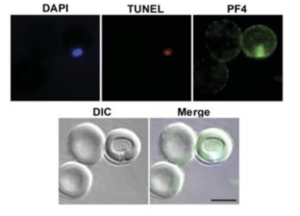
Koh et al., 2018 Fig 3I: Micrographs showing a PF4+TUNEL+ P. knowlesi infected cell after platelet treatment. Scale bars = 5 μm. Images were taken at 630x magnification on an Axio Observer inverted fluorescence microscope coupled to an Axiocam 503 monochrome camera with ZEN 2 software (Carl Zeiss, Germany). Bars indicate means of replicate data points. Abbreviation: DIC, differential interference contrast.
Platelets are the second most abundant cells in blood after red blood cells (RBCs), and are well known for their role in blood clot formation. Platelets also play a role in immune responses and may have protective roles in infectious diseases, such as malaria. Studies have shown that platelets can bind and kill infected P.falciparum-infected RBCs (iRBC) and platelet depletion results in increased mortality of Plasmodium sp. infected mice.
One of the proposed mechanisms of how platelets are involved in killing of Plasmodium sp, is through binding of platelet factor-4 (PF4) (a platelet antimicrobial protein) to parasites in iRBCs. However, a recent study did not reproduce these finding in an in vitro or murine model of Plasmodium sp. infection. Thus, Kho and colleges aimed to confirm and demonstrate that platelets are directly involved in killing of Plasmodium sp.
Researchers studied immune responses from a cohort of malaria patients from Indonesia and Malaysia, who were infected with various Plasmodium sp. (P.falciparum, P.vivax, P. knowlesi, P.malariae). Examination of blood specimens, showed that platelets bind and form stable complexes with iRBCs, and platelet-iRBC complexes are higher in patients with low levels of parasitemia. Additionally, they showed that iRBCs that harboured dead parasites also co-stained positive for PF4. Thus suggesting that intraerythrocytic death of plasmodium is associated with accumulation of platelet-derived PF4. Surprisingly, they also observed that PF4-plasmodium colocalisation was not exclusively dependent on the presence of a platelet-iRBC complex. Finally, they showed that growth inhibition of P.falciparum and P.knowlesi in culture requires either direct contract of platelets, platelets lysate or PF4.
In summary, this study represents one of the first studies to demonstrate that platelets can directly kill Plasmodium in their erythrocytic stage. Highlighting the role and importance of platelets during malaria infection.
Journal Article: Kho et al., 2018. Platelets kill circulating parasites of all major Plasmodium species in human malaria. Blood
Article by Cheleka AM Mpande










